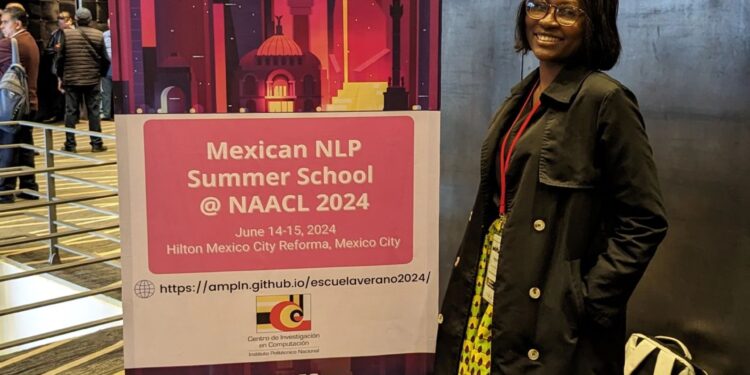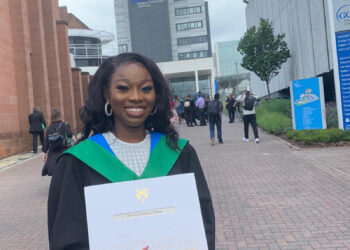At 26, Dr. Regina Ofori-Boateng has achieved what many spend a decade striving for; earning her PhD in Generative AI and Natural Language Processing in just three years from Robert Gordon University. As an AI Multi-Agents and Neurosymbolic Reasoning Research Fellow at Huawei R&D, she has already begun making waves in the cutting-edge world of artificial intelligence. In this exclusive interview with Diaspora Wire, she shares her journey, the challenges and triumphs of completing a PhD and insights into her groundbreaking research.
How long exactly did your PhD take?
It actually took me a little over two years. Roughly three years.
Let’s talk about your motivation. Why did you choose AI for your PhD, and why the UK for your studies?
So, to answer why I chose this path… honestly, I didn’t even know AI existed when I started. My bachelor’s was in biomedical engineering( University of Ghana), so my days were mostly spent in the lab, testing cells and doing other biomedical experiments. Then, in my third year, an NGO came to my university to teach coding to young women. I decided to join their program, which lasted six weeks. That experience completely changed my perspective.I realized I wanted to pursue computing.
Since I was already in my third year, switching courses would have been a huge waste of time, so I decided to complete the program and, afterward, plan for a master’s in a computing or AI-related field. That was my initial plan.
Then, when COVID hit, a friend introduced me to a tech program for Africans. The program offered several online courses on Udacity, including data science, cybersecurity, and others. I chose data science specifically because it was the most expensive course—they were funding it, and I thought, if someone is willing to invest in me, I should pick the one with the highest value. That marked the beginning of my career in data science and AI. Eventually, I pursued a PhD focusing on Natural Language Processing (NLP) and large language models (LLMs).
So, in summary, my motivation grew from a small internship-like experience in coding. At first, I didn’t even know this would become a career path, but over time, I realized programming and AI were exactly what I wanted to do.
As for why I chose the UK: before COVID, countries like the US required GREs and other lengthy application processes. The UK, on the other hand, didn’t require all of that, which made it a much more practical choice for me. Application fees were also lower—if they accepted you, great; if not, you simply tried elsewhere. That made the UK the most accessible option. Fortunately, the scholarship I received covered my PhD entirely, and my research was fully focused on AI. So that’s the journey—starting from biomedical engineering, discovering coding, exploring data science, and finally pursuing a fully funded PhD in AI in the UK
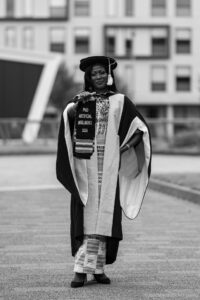
You mentioned your first degree wasn’t in computer science. So how was it like adjusting to a new set of learning and adapting to the new field?
To be completely honest, COVID really served as an icebreaker for me. It was during that time that I took the short data science course I mentioned earlier, and it was a pivotal moment—it introduced me to machine learning, data sources, and a bit of programming.
At the same time, while I was in Ghana, I was doing what’s called national service—similar to NYSC in Nigeria. During that period, I was also teaching at the university, so I was balancing my part-time teaching with taking open online courses to strengthen my knowledge.
To be very honest, my first year of the PhD was mostly about adjustment and self-learning. I spent much of that year taking open courses to bridge the gap between my biomedical engineering background and AI. Luckily, I had an excellent supervisor who supported me by recommending extra classes and resources, helping me catch up with the computational and mathematical foundations I needed.
The first year was heavily focused on understanding the mathematics behind machine learning and deep learning, as well as how AI models actually work. It was less about research at that stage and more about laying a strong conceptual foundation. Essentially, I was doing extra coursework, reading extensively, and immersing myself in the technical aspects of AI to prepare for the more advanced research that would come later
What were the particularly challenging experiences as an African student in the UK, and how did you surmount them?
As an African student from Ghana, I would say that the primary challenge I faced was adjusting to the system here. The educational and social systems back home are quite different from what you encounter in the UK. For example, the way things are scheduled, the time management expectations, even simple day-to-day activities like catching a bus; they’re all very structured and time-based here. So my very first challenge was learning to navigate and adapt to that system.
Another challenge was learning to make the most of the opportunities in this system. That meant letting go of certain cultural habits and mindsets I had grown up with and embracing new practices that could help me succeed academically and personally. It was about identifying what would work positively for me and adjusting accordingly.
Of course, like many international students, homesickness was a major factor. My family is in Ghana, and I’ve been here trying to manage everything on my own. For instance, just today on the bus, I met someone who asked me about my life and how I ended up in the UK. When I told him I’ve been here alone for over three and a half years, he was surprised and asked how I managed it. And honestly, it’s been a journey of independence, but it also underscores how much I’ve missed my family and the support system back home.
What were other memorable experiences that you had—academically or personally—after moving to the UK?
So, the most memorable experiences… I would say, in terms of teaching, there are a few that really stand out. One of the most significant was during what I’d call my ‘shortcut’ path. I went straight from my bachelor’s degree into a PhD program, which is not the usual route for most students. That transition itself was memorable because it was intense, challenging, and required me to quickly adapt to higher expectations academically.
Being in a PhD program straight from a bachelor’s meant I had to bridge gaps in knowledge while also trying to engage effectively in teaching and mentoring others. For most students, there’s a master’s in between, which gives time to adjust, but I had to navigate that adjustment simultaneously with research and teaching responsibilities. That made the experience both demanding and incredibly rewarding.
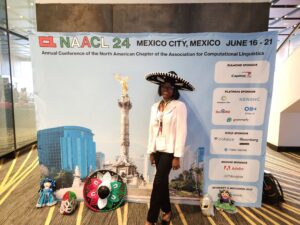
That must have been really tough for you?
Exactly. One of the most memorable experiences was actually a bit of a shock at first. It had a lot to do with the differences in educational culture, which you mentioned earlier. Back in Ghana, for example, there’s a very formal system—you have to address your professors by their titles, with a lot of respect, almost ceremonially. So naturally, when I first arrived here, on the very first day, my professor greeted me and addressed me by my first name. At first, it really threw me off. It took me a while, honestly, to come to terms with the idea that here, you address your professors—or even your dean—by their first names. That was definitely a cultural shock.
The second thing that struck me was how exams were set and graded. Here, it’s much more application-based. You really have to understand the material deeply and apply it, almost like storytelling, where you demonstrate how you can use what you’ve learned in practical situations. Back home, most of the time, the system is more theoretical. Lecturers would focus on explaining concepts and giving the theory behind things, and while that’s valuable, it’s quite different from the hands-on, applied approach I encountered here.
The last memorable thing was realizing that even as a student, you could actually have open discussions about your grades. You could approach your lecturer and say, ‘Based on my assessment, I don’t think I’ve been fairly treated. Can we discuss this?’ That level of transparency and openness was something I hadn’t experienced back home. It was definitely a cultural shift.
What I learned from all of this was to adapt and make the most out of the system. Embracing these differences, being open to negotiation, and understanding the flexibility here helped me grow both academically and personally. Those are some of the things that really stand out in my mind from my early days studying here.
As a Ghanaian, did you find a community or support system to help you settle in, and what was that experience like?
For the first few years, many people assumed I was Nigerian because of the large Nigerian population at my school. Most of my support came from my church, since the Ghanaian community at my university and in my neighborhood was minimal. Only recently, with more Ghanaians joining through government initiatives, has that changed. In the meantime, my church, which is predominantly Ghanaian, became my main support system. There, I could connect with fellow Ghanaians, speak my dialect Twi, and stay updated on news from home. School and neighborhood connections didn’t provide much support, so the church was essential for both social and cultural connection.
Could you explain the AI research you conducted during your PhD, particularly in NLP, in a way that’s easy for someone outside the field to understand? What was the application and value of your work?
In simple terms, my PhD research focused on building AI systems to help researchers and clinicians process and synthesize large volumes of information much faster. Typically, when academics, clinicians, or organizations like the NHS or the World Bank want to make evidence-based decisions, they have to conduct extensive literature reviews—searching, extracting, and mapping data from all available publications. This process can take a year or more, especially as new studies are published constantly. My work aimed to automate this process using AI. I developed a model that can search existing literature, extract relevant data, and synthesize it into actionable insights, drastically reducing the time required. Essentially, it’s about enabling faster, more accurate evidence gathering so that decision-makers don’t have to manually go through thousands of papers. This has direct applications in healthcare, research, and policy-making, where timely access to synthesized information can improve outcomes and efficiency.
Could you explain the focus of your research on large language models (LLMs) during your PhD and how it differed from existing AI tools?
My research was entirely research-based and largely supported through government grants aimed at open-source projects. I worked with advanced LLMs, including GPT and LAMA, to explore how these models could be improved and applied to real-world problems. The goal was to help researchers efficiently process vast amounts of information. For example, if a researcher wanted to study the impact of COVID on children, the AI could automatically gather all relevant literature, filter out irrelevant material, and highlight key findings.
What made my work different from existing AI tools was the focus on human-AI collaboration. Instead of creating isolated models, I aimed to design systems where humans could guide and interact with the AI to ensure relevance and accuracy. Additionally, I explored advanced reasoning techniques so that these models could generate better, more nuanced outputs. Essentially, the research was about enhancing AI reasoning and usability in practical research contexts, bridging the gap between automated processing and human expertise.

While you were conducting all this research, aside from the conclusions you reached, did you come across other opportunities that you believe are yet to be fully explored—areas where additional research is still needed?
Oh yes, absolutely. That’s a very broad question, but I can point to a critical area, particularly in the AI space.
A big part of my research involved the ethical dimension of AI. It’s not just about building AI models; the real question is: how sure are we that these models are safe and trustworthy? Because what’s the point of creating an AI system if we can’t trust its output?
Take ChatGPT, for example. When it first came out, everyone was excited. But soon, people began talking about hallucinations; instances where the model confidently produces inaccurate information. That triggered a lot of new research into ensuring that generative AI models don’t just produce text, but that what they produce is factually sound and suitable for human consumption.
Now, there is a major push toward improving the reasoning ability of AI,ensuring that models don’t simply generate content, but do so in a way that is reliable, aligned with human expectations, and ethically sound. Many big companies are investing heavily in this area, which I believe is one of the most promising frontiers for future research.
What would you say gave you the most fulfillment while working on your thesis?
I would say the greatest fulfilment came from the contributions my thesis generated. I was fortunate to have six publications from my research—some as first author, others as third,which was a significant achievement.
What made it truly rewarding was that these publications were accepted at top AI conferences, where I had the chance to present my work to leading experts in the field. Having my research not only reviewed but recognized at that level was incredibly validating.
Additionally, some of my work was published in high-impact journals, which added to the sense that I wasn’t just writing a theoretical thesis for academic purposes—it was contributing to the global AI research community. The opportunity to attend networking events and engage directly with top professionals also made the journey even more fulfilling.
The opportunities for collaboration between African universities and UK institutions in AI research seem wide. What are the most promising areas, and how should African leaders approach this?
The opportunities are truly enormous. I often tell people that AI is the future, and very soon, it will become a basic soft skill—just like how people list Python or Microsoft Word on their CVs today. Everyone will need at least a foundational understanding of AI to remain relevant, no matter their field.
When I say “soft skill,” I mean having a working knowledge of the basics, not necessarily becoming an AI engineer, but understanding enough to use AI tools responsibly and effectively. This is where partnerships and leadership vision come in.
Our leaders, especially in Africa, need to start thinking strategically about how to equip our people with AI skills at an early stage. I recently read about how China is integrating AI into its primary school curriculum. That really stood out to me because it shows a commitment to building the next generation of innovators from the ground up.
Imagine if African countries did the same—moving beyond teaching basic ICT skills like how to use a mouse or simple computer operations, and instead starting AI education at the primary school level. By the time these children reach university, they would already have the foundational knowledge needed to build AI solutions that address local and global challenges.
It’s not just about bringing African talent abroad; people will always travel for exposure and experience. The bigger question is: how are we giving back to our home countries and building sustainable systems for the next generation?
For me, the greatest opportunity lies in investing in young minds early, giving them not only the knowledge but also the mindset to innovate. If we do this, the next generation of African AI experts will not only contribute to global research but also lead groundbreaking work for the continent.
Considering your experiences and reflections, what do you think about the role of the next generation, especially in terms of education and technological skills like AI?
Honestly, with everything I’m doing right now, my mind always goes back to the next generation. I feel a deep sense of responsibility, not just for myself, but for the children who are coming after us. Personally, I have a strong desire to write books and create programs – initiatives that will empower young people and prepare them for a globalized, highly competitive world.
Why? Because the future is changing so fast. For example, children in countries like China are already being exposed to artificial intelligence (AI) at a very young age; some as early as six years old, right from primary school. Imagine the kind of head start that gives them. Now, compare that to Ghana or Nigeria. If we could reimagine our educational curricula to introduce these skills early on, not just in elite private schools but also in government schools, we could level the playing field and truly prepare African children for the future.
For me, it’s not just about personal success; it’s about societal impact. I feel that if I am blessed with certain experiences and opportunities, I have a duty to give back and help build the systems that will shape the next generation. I’m trusting God for the grace and resources to make this happen.
For someone interested in pursuing a PhD in tech or AI in the UK, what advice would you give your past self—or a new entrant—about building expertise, staying relevant, and navigating the life of a PhD student?
That’s a really good question, and I’d start by saying this—where the field of AI is going, having a PhD is a significant leverage. The title alone opens doors, but it’s not enough by itself. What truly sets you apart is the depth of your expertise and the skills you develop along the way.
If I could advise my past self or anyone just starting out, I’d say: yes, go for the PhD, but don’t rely on the degree alone. While pursuing your studies, take time to really build your technical abilities. Follow what the big tech companies are doing, because they often provide clues about where the industry is headed. I, for instance, regularly check IBM’s projections and future trend reports; they’re rarely wrong.
How did I even realize AI would be the next big thing? It happened during COVID. Back then, I was more focused on data science. But I started asking myself: “If I go for a master’s, which field should I choose to stay relevant long-term?” I did some research and found strong projections about AI, machine learning, and big data shaping the future. That was my wake-up call.
Even now, within AI, there are subfields that are emerging as game changers. My own research focus is not in the trendiest area at the moment, but I’m making a deliberate effort to expand because I want to stay relevant for the next 20–30 years, not just hold a PhD title.
Practical advice?
- Listen to podcasts and immerse yourself in discussions around AI advancements.
- Track tech companies; what they’re building now often signals where the industry is headed.
- Create and build something of your own. Don’t just study—develop a project, product, or research prototype. If the market becomes saturated, your portfolio of real creations will still set you apart. Finally, about the life of a PhD student—this journey is not just about academics. It’s about positioning yourself as both a scholar and a creator. The degree is important, but the future belongs to people who combine knowledge with innovation, foresight, and the ability to adapt.
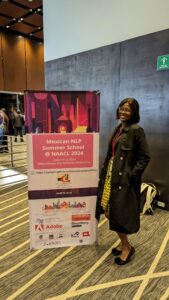 Especially for someone who’s thinking about starting a PhD this year, what should they realistically expect in terms of rigor, pressure, intensity, and workload? I know we don’t all have the same capacity, experience, or background, so some people may not approach it the same way you have. What should a new entrant really be prepared for?
Especially for someone who’s thinking about starting a PhD this year, what should they realistically expect in terms of rigor, pressure, intensity, and workload? I know we don’t all have the same capacity, experience, or background, so some people may not approach it the same way you have. What should a new entrant really be prepared for?
Honestly, your supervisor is everything. If your supervisor is supportive and invested, they can push you forward in a very short time. But if you have a less engaged supervisor, even a very capable student can end up stretching a PhD to five years. From my experience, one of the first things anyone starting a PhD should consider is the person they’re going to work with for the next three or four years. That choice can make an enormous difference.
Do you always have a choice of supervisor? Sometimes, yes. Let me explain from the UK perspective, since that’s where I did my PhD. If you’re looking to specialize in a particular field, like AI, and you’re at the School of Computer Science, for example, you’ll see a lot of people working in similar areas: one in data science, one in natural language processing, another in a different subfield. That gives you options to approach supervisors and see who aligns with your project. If it’s an unfunded PhD, you might be the one submitting the proposal and convincing a supervisor to take you on. They’ll look at your project and decide, “Okay, I feel like I want to work with this person.” But in a fully funded position, you might have less control, because the funding often dictates the supervisor. Either way, it’s vital that you “blend” well with your supervisor and that your working style is compatible.
I can give a personal example. My bachelor’s degree wasn’t even in the same field as my PhD, and I didn’t do a master’s beforehand. Yet, my supervisor would come sit with me in the office, and sometimes literally teach me how to code. That level of dedication and guidance is rare. Not every supervisor will give you that kind of time and mentorship, so finding the right one is crucial.
Beyond the supervisor, the journey itself requires a strong mindset because it is full of ups and downs. You often don’t know exactly what you’re doing because you’re exploring uncharted territory through your research. Things can go well, but they can also go poorly. For instance, my first paper faced five rejections. You submit, get feedback, revise, and resubmit, only to be told by an editor, “No, we don’t like it.” It can be exhausting, and sometimes the same paper has to go through several iterations.
The biggest lesson here is developing a growth mindset. It’s about understanding that the critique is not personal. When someone comments on your work, they are critiquing the work, not you. Learning to separate yourself from your research and accept constructive criticism is one of the most important lessons a PhD teaches. That perspective has stayed with me and continues to help me professionally today.
A PhD is also extremely demanding. The process is mentally and emotionally challenging. If you’re going to commit, you have to expect the pressure, the stress, and the intensity. But if you genuinely enjoy what you’re doing, it becomes rewarding. Everyone goes through struggles, I truly believe that no one comes out of a PhD without facing them. Finally, the journey teaches resilience, patience, and the ability to critically evaluate and improve your work. It doesn’t just make you a better researcher, it also makes you a better thinker, a better problem solver, and a person who can accept feedback and adapt. The lessons extend far beyond academia.


